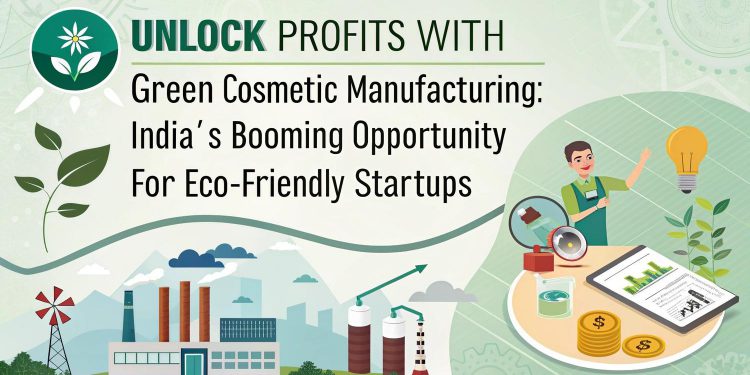The demand for personal care products that are safe, eco-friendly, and clean-label is rapidly escalating. Alongside this, there is an increasing need for Green Cosmetic eco-friendly locally sourced cosmetic raw materials. India has a vast bio-resource base and a growing formulation industry with an emerging startup ecosystem that is best suited to take advantage of this opportunity. As per the Chemical Weekly dated 03rd June 2025, Indian manufacturers are increasing the supply of green cosmetic.
The global Green Cosmetic beauty market is projected to grow to USD 22 billion by 2027. The inputs are bound to be plant-based, biodegradable, and non-toxic. Indian startups and MSMEs can crawl themselves strategically as providers of sustainable personal care ingredients not just for Indian brands but also for international value chains.
Why Local Production of Green Cosmetic Ingredients?
- Increasing Demand: Indian consumers are adopting herbal, ayurvedic and organic cosmetics.
- Regulatory Demand: Bans on microplastics and synthetic UV filters are opening new demand for greener alternatives.
- Supply Chain Localization: Brands want to depend less on imported constituent parts due to increasing freight costs and geopolitical tensions.
- Export Potential: Assistance from global brands sourcing from India requires green ingredients certified by COSMOS, ECOCERT, or USDA.
- Government Support: The special chemicals and startup PLI schemes are enhancing the appeal of making new investments into manufacturing.
Important Green Cosmetic Ingredients for Startups
1. Glycerol Esters and Derivatives of Fatty Acids
- Uses: Moisturizing products, hair serums, creams, lotions
- Product Examples: Glycerol monooleate, glyceryl stearate, mono and diglycerides
- Why It’s Promising: It’s relatively inexpensive to produce these high-margin ingredients, as they can be sourced from both vegetables and food oils, not to mention their widespread use in both food and cosmetics.
2. Natural Emollients and Conditioners
- Derived from: Coconut, castor and sunflower oils as well as jojoba
- Ingredients: Capric/caprylic triglycerides, isoamyl laurate, coco-caprylate, behenyl alcohol
- Chemical Weekly supports increasing efforts made to substitute imported greener alternatives with domestic substitutes in India.
Related: Herbal Cosmetics Handbook (Formulae, Manufacturing Processes with Machinery & Equipment Details) 4th Edition
3. Bio-Based Surfactants
- Used in: Shampoos, face washes, hand cleansers
- Types: Sodium cocoyl isethionate, coco-glucoside, decyl glucoside, lauryl glucoside
- Benefits: Mild on skin, biodegradable, and sulfate-free—ideal for premium and baby care products
4. Preservatives and Antioxidants from Plants
- Examples: Tocopherol (Vitamin E), rosemary extract, green tea polyphenols, benzoate sodium (natural grade)
- Advantage: Safer alternatives to parabens and BHA/BHT
5. Humectants as Well as Moisturizing Agents
- Ingredients: Bio-based propanediol, betaine, panthenol, sodium PCA
- Scope for Startups: Fermentation of sugarcane or corn to propanediol
6. Natural Waxes and Film Formers
- Used in: Lipsticks, balms, and mascaras
- Examples: Carnauba wax, beeswax, rice bran wax, candelilla wax
- Opportunity: Many of these are still imported, offering domestic production potential
7. Essential Oils and Natural Fragrances
- Popular Oils: Lavender, lemongrass, tea tree, peppermint
- Business Opportunity: Cold pressing and steam distillation units at the farm level present business opportunities for local and export markets
8. Biodegradable Exfoliants
- Use: Replacement for banned plastic microbeads
- Options: Apricot kernel powder, walnut shell powder, bamboo powder
- Sourcing: Agro-waste can be easily processed and sourced
Manufacturing Setup and Technology Requirements
- Reactors and mixing vessels with GMP compliance
- Spraying, filtration, and drying equipment depending on the ingredient
- Fermenters for microbiological ingredients like hyaluronic or lactic acid
- Emulsification and microencapsulation of high-end actives
- Stability testing and quality control labs with HPLC, GC-MS, and UV-VIS spectrophotometry
Regulatory and Certification Landscape
Compliance with these requirements is a must for startups:
- BIS standards alongside FSSAI (for dual-use ingredient)
- REACH with Organic and ECOCERT to the EU, USDA, COSMOS
- Drug and Cosmetics Act servicing raw material suppliers to personal care brands
B2B and D2C sales are strengthened through endorsement, enhancing brand trust.
Opportunities in Weaving Renewable Technologies Into Enterprises
- Ingredient Development: Integrate hydrating, UV protective, and anti-aging properties into a single ingredient
- Clean Tech Processing: Employ processes that use little energy or no solvent such as “green” solvents
- Private Label Ingredients: Develop custom ingredient blends for small D2C beauty brands
- Contract Extraction Services: Build infrastructure for brands that lack the facilities
- Local Sourcing Portals: Create online directories for cosmetic manufacturers and farmers
Market Growth Potential for Natural Ingredients
- Forecasted growth of 15% CAGR till 2030 for Ayurvedic and herbal cosmetic industry in India
- Women Indian-led startups like Juicy Chemistry and Earth Rhythm are actively looking for transparent supply chains
- The Body Shop and L’Oréal are increasingly sourcing sustainable ingredients from India
Setbacks
- Research and development along with standardization for quality mark consistency
- Need for a cold chain or stabilization for sensitive ingredients
- Teaching formulators to regard alternatives as competitive to synthetics
- Costs associated with scale and complexity of processes
Conclusion
The manufacturing of green cosmetic ingredients has a mult-billion rupee prospective opportunity for local Indian entrepreneurs. It meets global sustainability goals, fulfills domestic branding gaps, and bolsters farmer-led supply chains. There are numerous niches across the self-care category to be exploited and areitation, R&D investments, certifiaction, and innovation in process so turning these into profit is achievable.
It’s not only important for India to consume cosmetics, but to also emerge as a world-leading inovation center for clean cosmetic ingredients.
About NPCS
NPCS offers specialized services in preparing DPRs, Market Research Studies, and Techno Economic Feasibility Reports. These are tailored to the needs of entrepreneurs looking to establish units in industrial and manufacturing sectors right off the bat. NPCS has more than 40 years of experience serving clients all over the world and custom strategic project planning with qualified and in-depth market research.


















